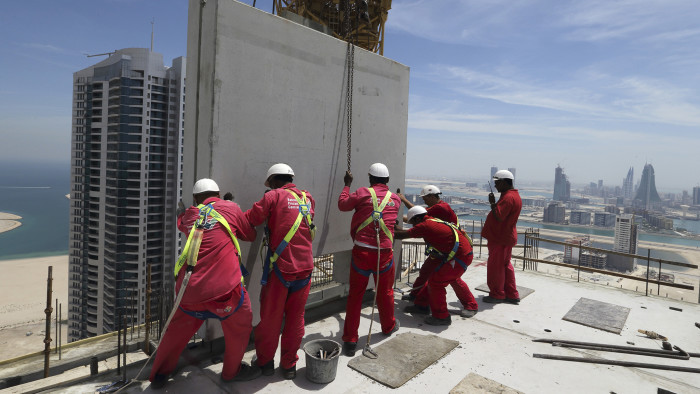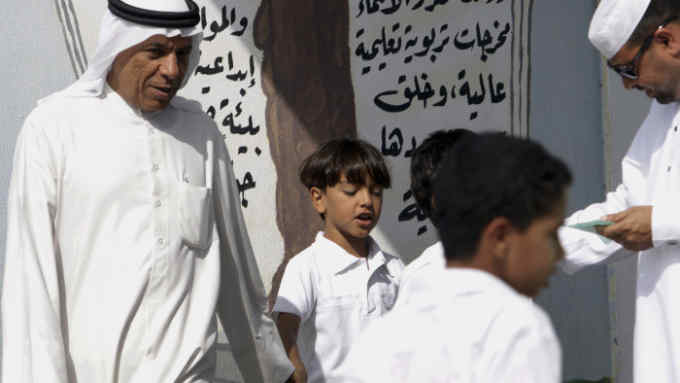Bahrain awaits cash injection from Gulf neighbours

Roula Khalaf, Editor of the FT, selects her favourite stories in this weekly newsletter.
Bulldozers rumble over land reclaimed from the sea, while cranes stretch above half-built high rises that will add to the gleaming office blocks, banks and malls shaping Manama. Over at Bahrain’s international airport, men work on a $1.1bn project to expand the terminal’s capacity from 9m to 14m passengers by next year.
The developments reflect the kingdom’s ambitions to revive its historical position as a regional financial and trade hub after Bahrain became swept up in Arab spring unrest in 2011. For years, the country had leveraged its reputation as one of the Gulf’s more liberal and open states to attract businesses keen to use Bahrain as a gateway to serve larger oil-rich neighbours.
The construction projects, partly funded by Gulf allies keen to bolster its stability, have helped drive growth during a period of subdued oil prices, with Bahrain’s economy outpacing other Gulf states since 2014. But as the expansion of Manama, the capital, has continued, Bahrain has fallen into a fiscal crisis, with policymakers failing to balance the books.
The kingdom was burdened with a budget deficit equivalent to 14 per cent of gross domestic product in 2017. Analysts expect public debt to climb from 90 per cent of GDP last year to close to 100 per cent next year. Rating agencies have downgraded its sovereign credit rating multiple times to junk status. In March, the government had to abort an attempt to raise more debt from international capital markets. A month later, the IMF warned that a “credibly large policy package” was “urgently needed”.
Now all eyes are on Bahrain’s neighbours in the expectation they will, once again, have to come to the kingdom’s rescue. In June, Saudi Arabia, the United Arab Emirates and Kuwait announced they would soon unveil a support package for Bahrain. But at the time of writing no details had been announced.
Bankers and analysts say the kingdom needs a multiyear, multibillion-dollar fiscal support programme to put Bahrain on a more sustainable course.
However, the months-long gap between the promise of help and delivery triggered speculation that the three neighbouring Gulf states want Manama to commit to more stringent economic reforms and will insist on greater scrutiny over how the financial assistance is used.
The challenge for Bahrain is to convince sceptics that it is willing to take the tough measures needed to increase revenue and reduce expenditure to repair its budget.
Like other Gulf states, Bahrain has for decades provided its citizens with subsidised fuel, water and electricity and relied on the civil service to provide many of its nationals’ jobs.
It has also marketed itself as a tax-friendly destination with cheaper operating costs than its rivals to lure investment — there is no income or corporate tax in the kingdom, even for foreign companies.
The government has been raising the price of fuel and electricity. But it has been reluctant to make radical changes as it balances the need for reform against supporting growth and not increasing its citizens’ financial burden, analysts say. The fiscal travails have coincided with low-level unrest within the majority Shia community, which has long complained of discrimination in areas such as employment and the allocation of housing.
The kingdom was rocked in 2011 when hundreds of thousands of people, mostly Shia, joined protests that shook the ruling al-Khalifa family’s grip on power.
The demonstrations ended after Saudi Arabia deployed troops to support Bahraini security forces. But unrest continued in Shia villages around Manama, and the government responded with a crackdown that resulted in more than 3,000 people being detained and allegations of abuses by security forces.
The US State Department said in its 2017 human rights report that the most significant issues included “reports of arbitrary or unlawful killings by security forces [and] allegations of torture of detainees and prisoners”.
Bahrain, an important western ally that hosts the US Navy’s Fifth Fleet, is unique in the Gulf in that it has a Shia majority ruled by a Sunni monarchy. The worst of the most recent protests is over, but the mood among many Shia shifts between anger and despondency.
The kingdom will hold parliamentary elections on November 24 with al-Wefaq, the main opposition movement, dissolved and its leader, Sheikh Ali Salman, imprisoned. Hundreds have fled into exile or been stripped of their nationality, activists say.
Opposition figures accuse the government of giving Sunni Arabs from other countries citizenship to alter the demographic balance of its 1.4m people, of whom 750,000 are foreigners. “There has been the total disintegration of the structure of the opposition,” says a prominent member of the Shia community, who does not want to be named for fear of retribution.
The government denies allegations of rights abuses, saying those jailed are “criminals” and blames al-Wefaq for stoking the unrest. It also accuses Iran of supplying weapons to militants who attacked security forces.
Zayed Alzayani, the industry, commerce and tourism minister, says the government cannot afford to have people “sabotaging” the parliamentary process. He insists the government will push ahead with economic reforms and will look to balance the budget by 2022. “We’re going to smooth it out as much as possible,” Mr Alzayani says. He adds: “With the fall of oil prices in 2015 we were caught out.”
The kingdom, the first Arab nation to begin producing crude, in 1932, is not oil-rich and relies on revenues from 150,000 barrels per day — half the production — from an oilfield it shares with Saudi Arabia. It has one of the region’s most diverse economies, including a financial centre that employs about 15,000 people. But petrodollars still contribute 75 per cent of state revenue.
The government announced in April that Bahrain had made its largest hydrocarbons discovery with at least 80bn barrels of shale oil. Bankers say the find could be transformative, but it is not yet known how much of the offshore field will be commercially recoverable.
Meanwhile, the country’s foreign reserves covered only 1.5 months of non-oil imports at the end of 2017, according to the IMF. Officials say the government will introduce a value added tax next year to boost revenue, a year after Saudi Arabia and the United Arab Emirates introduced similar taxes. But there are no plans to introduce income or corporate taxes, despite the IMF suggesting it should.
Khalid Al-Rumaihi, chief executive of Bahrain’s Economic Development Board, cites a pick-up in foreign direct investment, including a decision by Amazon to establish data centres in the kingdom, as proof that the country is getting back on its feet.
It is focusing on sectors such as fintech, IT, finance and manufacturing as the likes of Dubai, Abu Dhabi, Qatar and Saudi Arabia push ahead with their own development plans. “The FDI attraction is not just about attracting jobs, it’s about attracting high-quality jobs . . . and then it’s about equal opportunity for Bahrainis to get those jobs and making sure they’re prepared and skilled,” Mr Rumaihi says. “If we get that right . . . everything else falls into place.”
Much will depend on what kind of support the kingdom receives from its neighbours and whether social stability can be maintained. Even if help is forthcoming, Bahrain faces the challenge of carving out its niche in an increasingly competitive market.
Balancing the books
The Gulf Cooperation Council — the regional trade bloc of Arab countries that includes Bahrain — has supported growth in Bahrain over recent years, helping output to rise by 3.8 per cent in 2017.
But seven years on from the 2011 uprising, the kingdom, whose debt is rated as junk, faces a new challenge. Bahrain’s fiscal and debt crises have brought Gulf states into talks about a new bailout package to ward off a damaging sovereign default that could cause Bahrain to devalue its currency and abandon its peg to the dollar.
The government says it has made $2.3bn in savings since 2015 and will set up a cabinet task force to deliver an additional $2bn, to balance the budget by 2020.
“There’s more movement within the government to solve this problem for good,” says Zayed Alzayani, minister of industry, commerce and tourism. “If there are drastic measures to be taken, a pill we have to swallow, we swallow it once — we don’t just keep taking painkillers continuously.”
The kingdom’s debt as a proportion of gross domestic product reached 87 per cent in the second quarter of this year, up from 68 per cent in the same period in 2017. Reserves are projected to fall to $2.1bn next year, or less than one month’s imports, according to the IMF.
Bahrain’s woes came into focus in March when markets insisted that it pay a premium when the government returned for another bond issuance. This forced it to shelve the issuance and instead go ahead with an Islamic sukuk — a sharia-compliant instrument that is similar to bonds and attracts stronger demand from Middle Eastern investors.
In June, Saudi Arabia, the United Arab Emirates and Kuwait helped to prop up Bahrain’s flagging currency by pledging a new support package. At the time of writing, no details of the package had been announced.
The bailout could range from an immediate multibillion-dollar cash deposit to multiyear debt buybacks and project funding of up to $15bn, people briefed on the discussion say. Bahrain’s share of revenues from the Abu Safah oilfield it shares with Saudi Arabia, currently 50 per cent, could also be increased.
But the donor states, while committed to supporting political stability in Bahrain and the Gulf region through financial aid, are also pushing through their own austerity measures and will probably seek a commitment from Manama to curb its $3bn budget deficit more quickly, bankers say.
Opposition figures say years of deficits have been exacerbated by off-budget spending on arms purchases and royal court expenses. IMF statistics suggest large off-budget primary spending of $1.6bn, or 4.6 per cent of GDP, in 2017, according to a BofA Merrill Lynch Global Research report.
“The big problem facing the economy are unaccounted-for expenses,” says one opposition figure. “People should know what these are — there can’t be an open purse for the royal court.”
Analysts fear that targeting generous benefits and salaries enjoyed by loyalists within the Sunni community could broaden dissent beyond the marginalised Shia majority.
“To cut expenses more sharply is a difficult task, which leads to that dependency [on GCC aid] and it’s difficult because a fair bit has been done within what is possible without creating domestic social challenges,” says one senior banker in the kingdom. “There are only so many levers you can pull.” Simeon Kerr

Comments